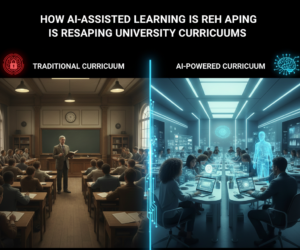Micro-Credentials: Are They the Next Generation of Diplomas? A Look at the Transition from Degrees to Skills

Micro-Credentials: Are They the Next Generation of Diplomas? A Look at the Transition from Degrees to Skills
For a long time, the conventional higher education system has placed a strong emphasis on formal degrees as the main means of assessing a student’s knowledge and ability to find employment. On the other hand, the abilities that an employee has are becoming more important to companies than formal credentials as the work market continues to change and technology continues to advance. The expansion of micro-credentials, which are certifications that are brief and focused on certain abilities and that serve to confirm those skills, has been driven by this transition. Micro-credentials are becoming more popular as versatile replacements or complements to standard degrees. They cover a wide range of subjects, including data analytics, project management, coding, and digital marketing.
1. What exactly are microcredentials?
Learners may obtain and show their mastery of certain abilities without committing to degree programs that require many years of study via the use of micro-credentials, which are competency-based certificates that are tiny in size. Micro-credentials, as opposed to traditional degrees, are characterized by the following:
- Focused: Concentrate on a restricted range of abilities or areas of expertise.
- Adaptable: Frequently finished online or part-time, which makes it appropriate for those who are employed in professional positions.
- Stackable: A larger portfolio of skills may be developed over time by combining these items.
- Verifiable: With the help of blockchain technology, which ensures safe validation, the number of digitally issued certificates is steadily growing.
- Micro-credentials are very versatile and may be easily adapted to meet the ever-changing needs of today’s workforce as a result of these features.
2. The Increasing Significance of Skills Over Degrees
There are a number of developments that are contributing to the movement away from formal degrees and toward skill-based validation:
- Rapid Technological Advancement
- The old curriculum may not be able to teach the most current and practical information about new technologies such as artificial intelligence, blockchain, and cloud computing in a timely manner.
- The Demand of Employers for Job-Ready Talent
- Businesses are placing a greater emphasis on hiring people who have the ability to carry out certain jobs right away, as opposed to depending on theoretical knowledge that they obtained in the past.
3. The Requirements for Continuous Learning
In today’s world, employees are confronted with careers that might last for decades, which necessitates a commitment to ongoing learning and the development of new skills. Micro-credentials are a more efficient means of facilitating this process than complete degrees.
Competition on a global scale and remote work
As a result of the increase in remote work, businesses are now assessing talent on a worldwide scale. This has rendered credentials that are verifiable and based on skills more important than conventional certificates.
4. Benefits of Micro-Credentials for Students
Micro-credentials provide a variety of advantages to students and professionals alike:
- Affordability: Lower expenses compared to conventional degree programs.
- Time Efficiency: Gain valuable skills in a matter of weeks or months, rather than years.
- Career Mobility: Establish your competence in order to transition to a different industry or to climb the corporate ladder in your present sector of employment.
- Personalized Learning Paths: Select the certificates that are most relevant to your own personal objectives and areas of interest.
- This flexibility is especially appealing to job changers, adult learners, and professionals from across the world who are looking to acquire specific expertise.
4. The University Perspective: Is It a Threat or an Opportunity?
Universities are presented with both obstacles and prospects as a result of this transition:
Difficulties
- Possible decrease in enrollments for full-degree programs
- Pressure to quickly update courses in order to maintain their relevance
- Competition from nimble educational technology businesses that provide courses that are focused on skills
- Opportunities
- In addition to regular degrees, provide the option of earning micro-credentials.
- Collaborate with businesses in the field to design certificates that are specific to the needs of employers and are recognized by them.
- Improve programs for lifelong learning and online offers
- Micro-credentials are being welcomed by a large number of institutions as a complementing approach as opposed to a substitute for traditional degrees.
5. The Benefits of Micro-Credentials for Employers
There are a number of ways in which micro-credentials might be advantageous to employers:
- Expedited Screening: Use credentials that can be verified to quickly evaluate the abilities of candidates.
- Focused Training: Identify and address any shortcomings in the skill sets of current teams.
- Diminished Risk of Hiring: The reduction of dependence on resumes and interviews alone is achieved by the use of evidence-based verification.
- In response to this trend, companies like IBM, Google, and Microsoft have begun to provide their own micro-certifications, which are recognized throughout the industry.
6. Examples of Micro-Credentials That Are Currently in Demand
The following are some of the sectors in which micro-credentials have seen the most growth:
- Technology: Coding bootcamps, cloud certifications, cybersecurity courses
- Business and Management: Project management, digital marketing, and data analytics
- Graphic design, user experience/user interface design, and video creation are all considered to be creative fields.
- Healthcare and Science: Telehealth training, laboratory procedures, and biotechnology are all included in this category.
- Because these certificates may be stacked on top of one another, students are able to create a portfolio that is comparable in scope to that of someone who has earned a conventional degree.
7. Problems and Constraints
Micro-credentials are advantageous in a number of ways, but they also present some difficulties:
- Recognition: Employers and industries do not all place the same amount of importance on them.
- Standardization: The absence of standardized practices across different suppliers might lead to misunderstanding.
- Depth of Knowledge: Micro-credentials may not give the wide theoretical background afforded by degrees.
- Motivation: Self-paced programs need self-discipline and may not provide mentoring assistance.
- In order for micro-credentials to become generally recognized as legitimate alternatives, it is essential to address these problems.
8. Degrees and Skills in Combination: The Future of Education
- Micro-credentials are expected to survive alongside regular certificates in a complimentary format, rather than completely replacing them.
- Degrees give core knowledge, critical thinking, and academic reputation.
- Micro-credentials provide practical, specialized abilities that have been certified for use in the workplace.
- Students are able to combine academic depth with career-ready talents by using this hybrid method, which improves their employability and provides them with additional chances for lifetime learning.
The landscape of higher education is being transformed by the trend away from degrees and toward skills. Micro-credentials are a versatile, cost-effective, and verifiable method of demonstrating expertise in a continuously changing labor market. Although conventional degrees are still considered to be significant for the basic information that they provide and the legitimacy that they confer, micro-credentials are becoming more and more popular as a means of advancing one’s career, engaging in lifelong learning, and maintaining professional relevance. Those who combine a strong academic foundation with a collection of skill-based micro-credentials could be the most competitive learners in 2025 and beyond.




